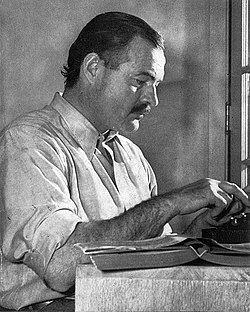Ernest Hemingway Quote
This was the greatest gift that he had, the talent that fitted him for war; that ability not to ignore but to despise whatever bad ending there could be. This quality was destroyed by too much responsibility for others or the necessity of undertaking something ill planned or badly conceived. For in such things the bad ending, failure, could not be ignored. It was not simply a possibility of harm to one's self, which be ignored. He knew he himself was nothing, and he knew death was nothing. He knew that truly, as truly as he knew anything. In the last few days he had learned that he himself, with another person, could be everything. But inside himself he knew that this was the exception. That we have had, he thought. In that I have been most fortunate. That was given to me, perhaps, because I never asked for it. That cannot be taken away nor lost. But that is over and done with now on this morning and what there is to do now is our work.
This was the greatest gift that he had, the talent that fitted him for war; that ability not to ignore but to despise whatever bad ending there could be. This quality was destroyed by too much responsibility for others or the necessity of undertaking something ill planned or badly conceived. For in such things the bad ending, failure, could not be ignored. It was not simply a possibility of harm to one's self, which be ignored. He knew he himself was nothing, and he knew death was nothing. He knew that truly, as truly as he knew anything. In the last few days he had learned that he himself, with another person, could be everything. But inside himself he knew that this was the exception. That we have had, he thought. In that I have been most fortunate. That was given to me, perhaps, because I never asked for it. That cannot be taken away nor lost. But that is over and done with now on this morning and what there is to do now is our work.
Related Quotes
About Ernest Hemingway
Hemingway was raised in Oak Park, Illinois, a suburb of Chicago. After high school, he spent six months as a reporter for The Kansas City Star before enlisting in the Red Cross. He served as an ambulance driver on the Italian Front in World War I and was seriously wounded by shrapnel in 1918. In 1921, Hemingway moved to Paris, where he worked as a foreign correspondent for the Toronto Star and was influenced by the modernist writers and artists of the "Lost Generation" expatriate community. His debut novel, The Sun Also Rises, was published in 1926. In 1928, Hemingway returned to the U.S., where he settled in Key West, Florida. His experiences during the war supplied material for his 1929 novel A Farewell to Arms.
In 1937, Hemingway went to Spain to cover the Spanish Civil War, which formed the basis for his 1940 novel For Whom the Bell Tolls, written in Havana, Cuba. During World War II, Hemingway was present with Allied troops as a journalist at the Normandy landings and the liberation of Paris. In 1952, his novel The Old Man and the Sea was published to considerable acclaim, and won the Pulitzer Prize for Fiction. On a 1954 trip to Africa, Hemingway was seriously injured in two successive plane crashes, leaving him in pain and ill health for much of the rest of his life. He committed suicide at his house in Ketchum, Idaho, in 1961.
